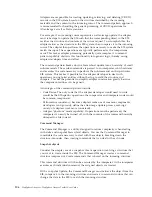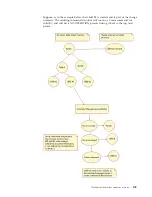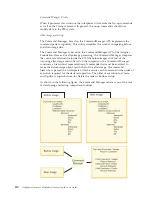
objectAnnotationsMap
ObjectName
WBI_CUSTOMER_CI
Operation
operationsList
createOperationsMap
Name
Create
MethodName
MethodNameList
operationList
updateOperationMap
createOperationMap
methodNameList
wbiCustomerCreate
The Metadata API
Advanced implementations of adapters are metadata-driven. This implies that the
adapter is not hard coded for each object type in the system, but rather has a form
of discovery in which a representation of the object (the metadata) in the EIS is
constructed at build time, then at runtime the adapter uses this metadata, along
with the data, to process the object. Metadata can be in a preexisting format, such
as a standardized schema. Standard metadata includes such information as
property name, property type, maximum length, cardinality, and anything else that
can be described in a standard schema. Metadata may also be in a format decided
by the adapter. This form of metadata is called
″
Application Specific Information
″
,
or ASI. ASI can occur in three places.
v
Object level metadata
This includes the information about what type is being processed
v
Operation level metadata
This is context-specific object metadata, that is valid for the operation being
processed at this time.
v
Property level metadata
This is information about the one property in the EIS schema. It may contain
such information as the column name as it occurs in the EIS, which may be
different than the property name in the object.
In order for the adapters to handle multiple representations of metadata;
specifically SDO and JavaBean, the Foundation classes provide an API for the
adapters and abstracts the metadata representation. The intention of this Metadata
API is to present both structural and application-specific metadata to the adapter,
so the adapter is insulated from the metadata format. For example, a JavaBean or
an SDO may be used as metadata, but the adapter can use the same metadata APIs
to walk over the structure and to extract the desired information from it.
Adapter implementations should use the following interfaces when retrieving
metadata. Adapters should never cast to an implementation of these interfaces.
WebSphere Adapter development overview
119
Summary of Contents for WebSphere Adapters
Page 2: ......
Page 6: ...iv WebSphere Adapters WebSphere Adapter Toolkit User Guide...
Page 220: ...214 WebSphere Adapters WebSphere Adapter Toolkit User Guide...
Page 224: ...218 WebSphere Adapters WebSphere Adapter Toolkit User Guide...
Page 225: ......
Page 226: ...Printed in USA...
















































